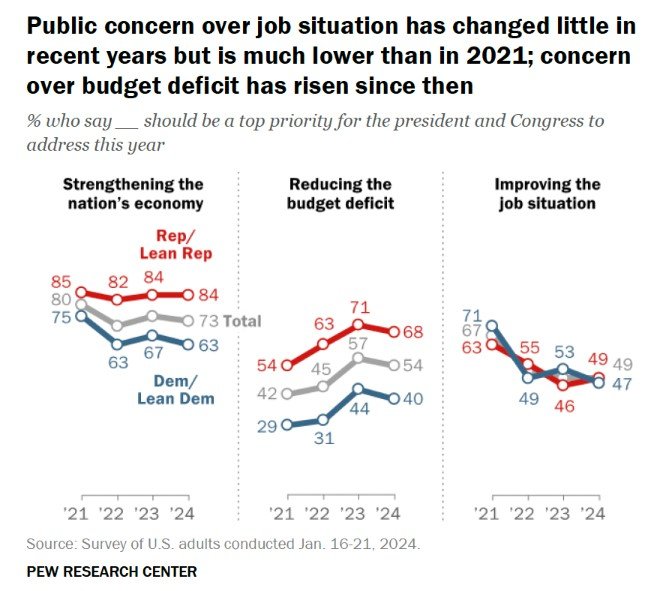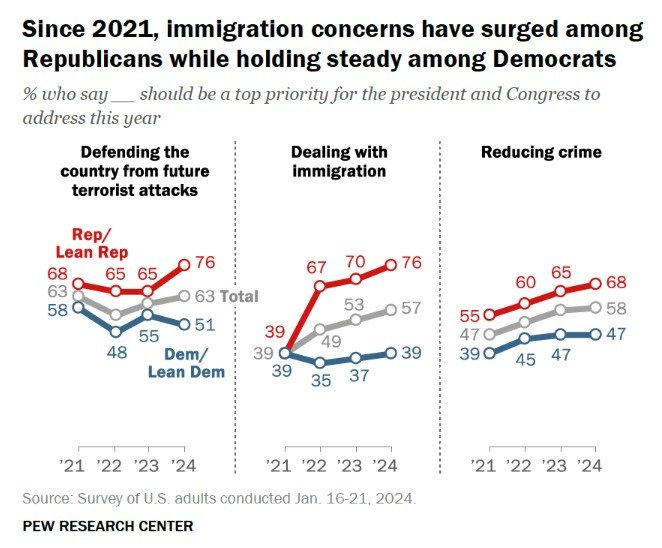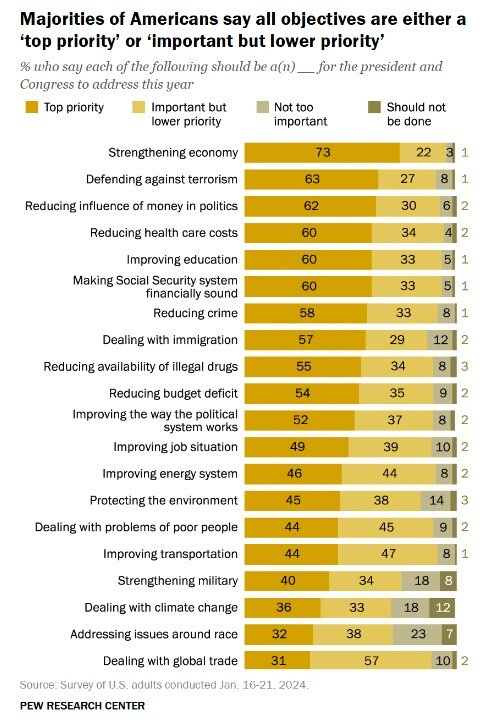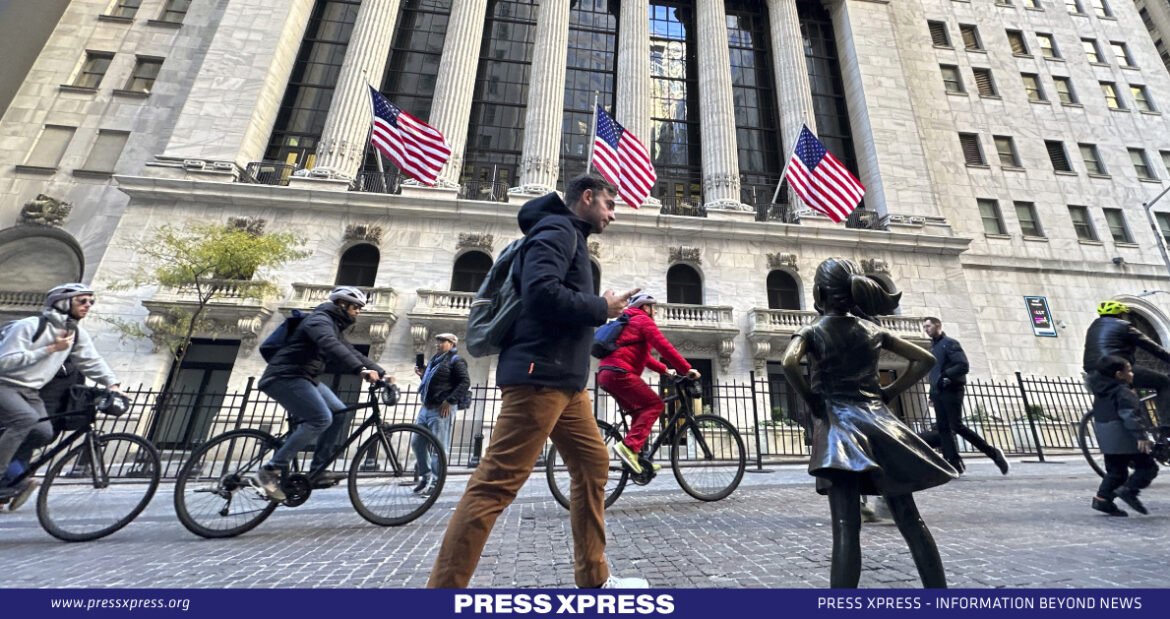Despite disparities based on political affiliation, race, ethnicity, and age, there’s a consensus that all policy objectives should be pursued to some degree in 2024, reflecting a diverse yet united national agenda
While President Joe Biden was getting ready for his third State of the Union address on March 7, 2024, then Americans prioritized strengthening the economy as the top policy concern for both Biden and Congress this year. According to the Pew Research Center survey conducted January 16-21, 2024, 73% of Americans see bolstering the economy as the foremost priority, with no other issue standing out prominently. The public’s agenda remains largely consistent with the past few years, with the economy consistently topping the list.
However, there has been a notable shift among Republicans, who increasingly prioritize immigration and terrorism, as well as concerns over crime. Despite partisan differences, there is bipartisan support for reducing the influence of money in politics. Additionally, there are disparities in policy priorities based on factors like political affiliation, race, ethnicity, and age. Overall, while there are varying priorities among different groups, most Americans believe that all policy objectives should be pursued to some degree in 2024.
Diverse Policy Agendas
Policy priority areas for Republicans and Democrats are mentioned below:
The Economy, Budget Deficit and Job Situation
According to the Pew Research Center survey public concern over the job situation has changed little in recent years but is much lower than in 2021; concern over budget deficit has risen since then.
Large shares of Republicans and Republican-leaning independents (84%) and Democrats and Democratic leaners (63%) view strengthening the nation’s economy as a top priority this year, as they have for the past several years.

And while more Americans say the budget deficit is a top priority now than did when Biden first took office in 2021, their views are similar compared with last year (54% now vs. 57% then).
Republicans (68%) remain more concerned about the deficit than Democrats (40%). By comparison, about half of the public (49%) – including nearly identical shares in both parties – view improving the job situation as a top priority. Concerns over the job situation have declined sharply since 2021, during Biden’s first year in office and when the coronavirus pandemic was ravaging the country.
Security, Crime, And Immigration
According to Pew Research, growing concerns persist regarding national security, crime, and immigration. Approximately sixty percent of Americans prioritize safeguarding the nation from future terror threats (63%), addressing immigration (57%), and mitigating crime (58%) as crucial political objectives for the upcoming year. While the overall sentiments toward these policy areas have remained relatively stable over the past year, Republicans exhibit heightened apprehension compared to Democrats on each front.

In the realm of terrorism, a trend analysis since 2021 indicates a notable uptick among Republicans, with 76% currently expressing concern compared to 65% last year. Conversely, approximately half of Democrats (51%) prioritize terrorism this year, which reflects a slight increase from the previous year’s 55%.
Regarding immigration, the proportion of Republicans considering it a top policy priority surged from 39% to 67% between 2021 and 2022 and has since climbed to 76%. Conversely, Democratic views have remained relatively constant, with 39% rating addressing immigration as a top priority.
While the importance of reducing crime has remained largely unchanged since the previous year, both parties have displayed heightened concern since the onset of Biden’s presidency. Presently, approximately seventy percent of Republicans (68%) prioritize crime reduction, marking a thirteen-point increase since 2021. Similarly, nearly half of Democrats (47%) prioritize this issue, reflecting an eight-point increase over the same period.
Republican vs. Democratic Priorities
Policy priorities differences catalysts are discussed below;
Disparities Exist by Policy Objectives
According to Pew Research Study, this year (2024), Republicans’ primary focuses include the economy, terrorism, and immigration, whereas Democrats prioritize healthcare costs, the economy, education, and environmental issues. Although both parties agree on certain priorities, such as economic strengthening, campaign finance reform, and ensuring Social Security’s fiscal stability, they diverge significantly on others.
For instance, Democrats are substantially more likely than Republicans to prioritize protecting the environment (63% vs. 23%) and dealing with climate change (59% vs. 12%).
By comparison, Republicans are much more likely to prioritize dealing with immigration (76% vs. 39%) and strengthening the military (56% vs. 23).

Disparities Across Race and Ethnicity
There are differences in policy priorities among various racial and ethnic groups. A substantial majority across these groups prioritize economic strengthening as a top political goal this year, alongside defending against terrorism and diminishing the influence of money in politics.
However, discrepancies emerge on other issues:
While 41% of White adults prioritize job improvement, the majority of Black (64%), Hispanic (65%), and Asian Americans (62%) share this priority.
White and Asian adults (38% each) are less likely than Hispanic (51%) and Black adults (70%) to prioritize addressing poverty-related issues.
Black adults (65%) are notably more inclined to address racial concerns compared to Hispanic (42%), Asian (32%), or White adults (23%)

Policy Priorities by Age
American policy indicates that younger adults are less inclined to prioritize several issues for 2024, including terrorism and immigration. Despite this, a significant percentage across all age groups consider reducing healthcare costs and enhancing education as top political priorities this year.
However, older Americans show particular emphasis on certain issues. For example, a vast majority of those aged 65 and older (87%) and a significant portion of those aged 50 to 64 (76%) prioritize defending against terrorism. This priority diminishes among younger age groups, with only 55% of those aged 30 to 49 and 35% of those aged 18 to 29 considering it a top priority.

Minimal Opposition to Policy Objectives
Despite disparities in perceived priority levels for certain issues, a small proportion of Americans believe that any of the surveyed issues should not be prioritized by the president and Congress in 2024.
For all but three issues surveyed, a negligible percentage (3% or less) advocate against pursuing these policy areas. The exceptions are climate change (12%), military strengthening (8%), and addressing racial issues (7%).

Similarly, few believe that any of these policy areas are “not too important” to be addressed this year, with at most about a quarter expressing this sentiment for the same three policy issues.
In conclusion, according to the Pew Research Study, it’s evident that strengthening the economy remains the top concern for Americans, transcending partisan lines. While Republicans emphasize immigration, terrorism, and crime, Democrats prioritize healthcare, education, and environmental issues. Despite disparities based on political affiliation, race, ethnicity, and age, there’s a general consensus that all policy objectives should be pursued to some degree in 2024, reflecting a diverse yet united national agenda.


